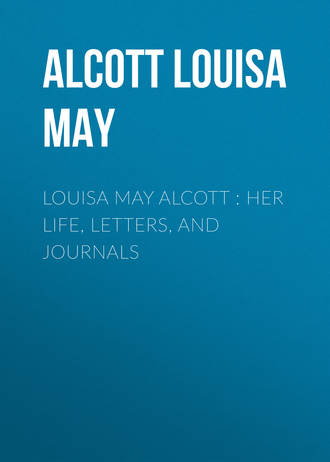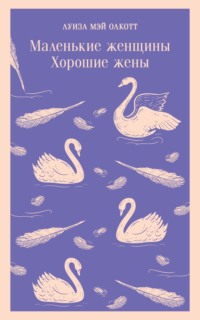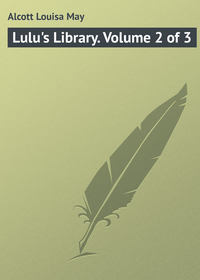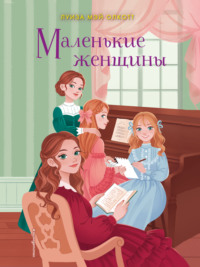 полная версия
полная версияLouisa May Alcott : Her Life, Letters, and Journals
August, 1850.–School is hard work, and I feel as though I should like to run away from it. But my children get on; so I travel up every day, and do my best.
I get very little time to write or think; for my working days have begun, and when school is over Anna wants me; so I have no quiet. I think a little solitude every day is good for me. In the quiet I see my faults, and try to mend them; but, deary me, I don't get on at all.
I used to imagine my mind a room in confusion, and I was to put it in order; so I swept out useless thoughts and dusted foolish fancies away, and furnished it with good resolutions and began again. But cobwebs get in. I'm not a good housekeeper, and never get my room in nice order. I once wrote a poem about it when I was fourteen, and called it "My Little Kingdom." It is still hard to rule it, and always will be I think.
Reading Miss Bremer and Hawthorne. The "Scarlet Letter" is my favorite. Mother likes Miss B. better, as more wholesome. I fancy "lurid" things, if true and strong also.
Anna wants to be an actress, and so do I. We could make plenty of money perhaps, and it is a very gay life. Mother says we are too young, and must wait. A. acts often splendidly. I like tragic plays, and shall be a Siddons if I can. We get up fine ones, and make harps, castles, armor, dresses, water-falls, and thunder, and have great fun.
It was at this period of her life that she was violently attacked by a mania for the stage, and the greater part of her leisure time was given to writing and enacting dramas. Her older sister, Anna, had the same taste, and assisted her in carrying out all her plans. A family of great talent with whom they were intimate joined with them, and their mother always allowed them to have all the private theatricals they wished to perform.
Some of these early plays are preserved in manuscripts as she wrote them. They are written in stilted, melodramatic style, full of highstrung sentiments of loyalty, honor and devotion, with the most improbable incidents and violent devices, and without a touch of common life or the slightest flavor of humor. The idea of self-sacrifice always comes into them; but they are thoroughly girlish. It is so that girls dream and feel before they know life at all. Their hearts are full of vague, restless longings, and they seek some vent for the repressed energies of their natures away from the prosaic realities of the present. While Louisa sat sewing the tedious seams of her daily task what a relief it was to let her imagination run riot among the wildest and most exciting scenes. Of course she had a "Bandit's Bride" among her plays. "The Captive of Castile; or, The Moorish Maiden's Vow," is preserved entire, and is a good specimen of these girlish efforts. It is full of surprises and concealments, and the denouement is as unnatural as could well be imagined. The dialogue is often bright and forcible, and the sentiments always lofty, and we have no doubt it seemed very grand to the youthful audience. It is taken from her reading, with no touch of her own life in it. This is not the same play described with such a ludicrous finale in "Little Women," although the heroine bears the same favorite name of Zara. Her own early amusement was, however, fully in her mind when she wrote that scene, which is true to fact.
A friend and relative of the family living in Roxbury, Dr. Windship, was much interested in the development of Louisa's dramatic talent. The girls always enjoyed delightful visits at his house. He tried to help the young dramatist to public success, and writes to her mother:–
I have offered to Mr. Barry of the Boston Theatre Louisa's "Prima Donnas." He is very much pleased with it just as it is, and will bring it out this season in good style. He thinks it will have a fine run.
Mrs. Barry and Mrs. Wood consented to take the principal characters. But from some difficulty in the arrangements "The Rival Prima Donnas" was not produced. One great pleasure was gained, however, as Mr. Barry gave her a free pass to the theatre, which proved a source of constant refreshment and delight.
Of course Louisa was eager to go on to the stage herself. She had indeed extraordinary dramatic power, and could at any time quickly transform herself into Hamlet, and recite a scene with tragic effect. But the careful mother knew better than the girl the trials and dangers of the profession, and dissuaded her from it. She also knew how little such youthful facility of expression indicates the power which will make a great actress. Louisa has reproduced her dramatic experience in "Work," which gives a picture faithful in spirit and in many of its details to this phase of her life. She here indicates a knowledge of her own limitation of talent. "Christie's gala" was a part quite after her own heart.
A farce, called "Nat Batchelor's Pleasure Trip; or, The Trials of a Good-natured Man," was brought out at the Howard Athenaeum. The papers of the day said of it: "It is a creditable first attempt at dramatic composition, and received frequent applause." Another critic says: "It proved a full success." This performance, however, took place in 1860,–a later period than that of which I am now speaking.
An incident which occurred at this representation probably suggested scenes which recur in "Work" and other of Miss Alcott's stories.
Quite a hit was made by a little girl, a Miss Jones, who, having to speak but a few lines, spoke them so well that upon her exit she received the rare compliment of an enthusiastic recall from the audience, despite the fact that "some necessary question of the play was then to be considered." For the time being she certainly was the sensation of the piece.
Miss Alcott had in Dr. Windship a kind and judicious helper in her dramatic undertakings, with whom she kept up a correspondence under the names of Beaumont and Fletcher.
In 1851 Louisa had an experience which she has reproduced in her story called "How I Went Out to Service." Her mother's work among the poor of Boston led to her being applied to for employment, and at one time she kept a regular intelligence office. A gentleman came to her seeking a companion for his aged father and sister, who was to do only light work, and to be treated with the greatest respect and kindness. As Mrs. Alcott did not readily think of any who would fill the place, the impulsive Louisa suggested, "Why couldn't I go, Mother?" She went, and had two months of disappointment and painful experience which she never forgot. She wrote out the story which was published later, called "How I Went Out to Service."
The story has an important lesson for those who condemn severely young girls who prefer the more independent life of the factory or shop to what is considered the safety and comfort of service in families. If a girl like Louisa Alcott, belonging to a well-known, highly esteemed family, and herself commanding respect by her abilities and character, could be treated with such indignity by a family in which no one would have feared to place her, how much may not a poor unfriended girl be called upon to endure!
Journal1851.–We went to a meeting, and heard splendid speaking from Phillips, Channing, and others. People were much excited, and cheered "Shadrack and liberty," groaned for "Webster and slavery," and made a great noise. I felt ready to do anything,–fight or work, hoot or cry,–and laid plans to free Simms. I shall be horribly ashamed of my country if this thing happens and the slave is taken back.
[He was.–L. M. A.]
1852.–High Street, Boston.– After the small-pox summer, we went to a house in High Street. Mother opened an intelligence office, which grew out of her city missionary work and a desire to find places for good girls. It was not fit work for her, but it paid; and she always did what came to her in the way of duty or charity, and let pride, taste, and comfort suffer for love's sake.
Anna and I taught; Lizzie was our little housekeeper,–our angel in a cellar kitchen; May went to school; father wrote and talked when he could get classes or conversations. Our poor little home had much love and happiness in it, and was a shelter for lost girls, abused wives, friendless children, and weak or wicked men. Father and Mother had no money to give, but gave them time, sympathy, help; and if blessings would make them rich, they would be millionnaires. This is practical Christianity.
My first story was printed, and $5 paid for it. It was written in Concord when I was sixteen. Great rubbish! Read it aloud to sisters, and when they praised it, not knowing the author, I proudly announced her name.
Made a resolution to read fewer novels, and those only of the best. List of books I like:–
Carlyle's French Revolution and Miscellanies.
Hero and Hero-Worship.
Goethe's poems, plays, and novels.
Plutarch's Lives.
Madame Guion.
Paradise Lost and Comus.
Schiller's Plays.
Madame de Staël.
Bettine.
Louis XIV.
Jane Eyre.
Hypatia.
Philothea.
Uncle Tom's Cabin.
Emerson's Poems.
In "Little Women" (p. 174), she has told a story which has usually been supposed to represent her first success in literature; but she has transferred the incident from her sister to her own representative, Jo. It was the quiet Anna who had secretly written a story and fastened it inside of a newspaper. She read it to her mother and sisters, as described in the book, and was very much delighted with their approbation and astonishment.
1853.–In January I started a little school,–E. W., W. A., two L's, two H's,–about a dozen in our parlor. In May, when my school closed, I went to L. as second girl. I needed the change, could do the wash, and was glad to earn my $2 a week. Home in October with $34 for my wages. After two days' rest, began school again with ten children. Anna went to Syracuse to teach; Father to the West to try his luck,–so poor, so hopeful, so serene. God be with him! Mother had several boarders, and May got on well at school. Betty was still the home bird, and had a little romance with C.
Pleasant letters from Father and Anna. A hard year. Summer distasteful and lonely; winter tiresome with school and people I didn't like. I miss Anna, my one bosom friend and comforter.
1854.–Pinckney Street.– I have neglected my journal for months, so must write it up. School for me month after month. Mother busy with boarders and sewing. Father doing as well as a philosopher can in a money-loving world. Anna at S.
I earned a good deal by sewing in the evening when my day's work was done.
In February Father came home. Paid his way, but no more. A dramatic scene when he arrived in the night. We were waked by hearing the bell. Mother flew down, crying "My husband!" We rushed after, and five white figures embraced the half-frozen wanderer who came in hungry, tired, cold, and disappointed, but smiling bravely and as serene as ever. We fed and warmed and brooded over him, longing to ask if he had made any money; but no one did till little May said, after he had told all the pleasant things, "Well, did people pay you?" Then, with a queer look, he opened his pocket-book and showed one dollar, saying with a smile that made our eyes fill, "Only that! My overcoat was stolen, and I had to buy a shawl. Many promises were not kept, and travelling is costly; but I have opened the way, and another year shall do better."
I shall never forget how beautifully Mother answered him, though the dear, hopeful soul had built much on his success; but with a beaming face she kissed him, saying, "I call that doing very well. Since you are safely home, dear, we don't ask anything more."
Anna and I choked down our tears, and took a little lesson in real love which we never forgot, nor the look that the tired man and the tender woman gave one another. It was half tragic and comic, for Father was very dirty and sleepy, and Mother in a big nightcap and funny old jacket.
[I began to see the strong contrasts and the fun and follies in every-day life about this time.–L. M. A.]
Anna came home in March. Kept our school all summer. I got "Flower Fables" ready to print.
Louisa also tried service with a relative in the country for a short time, but teaching, sewing, and writing were her principal occupations during this residence in Boston.
These seven years, from Louisa's sixteenth to her twenty-third year, might be called an apprenticeship to life. She tried various paths, and learned to know herself and the world about her, although she was not even yet certain of success in the way which finally opened before her and led her so successfully to the accomplishment of her life-purpose. She tried teaching, without satisfaction to herself or perhaps to others. The kind of education she had herself received fitted her admirably to understand and influence children, but not to carry on the routine of a school. Sewing was her resource when nothing else offered, but it is almost pitiful to think of her as confined to such work when great powers were lying dormant in her mind. Still, Margaret Fuller said that a year of enforced quiet in the country devoted mainly to sewing was very useful to her, since she reviewed and examined the treasures laid up in her memory; and doubtless Louisa Alcott thought out many a story which afterward delighted the world while her fingers busily plied the needle. Yet it was a great deliverance when she first found that the products of her brain would bring in the needed money for family support.
L. in Boston to A. in SyracuseThursday, 27th.Dearest Nan,–I was so glad to hear from you, and hear that all were well.
I am grubbing away as usual, trying to get money enough to buy Mother a nice warm shawl. I have eleven dollars, all my own earnings,–five for a story, and four for the pile of sewing I did for the ladies of Dr. Gray's society, to give him as a present.
… I got a crimson ribbon for a bonnet for May, and I took my straw and fixed it nicely with some little duds I had. Her old one has haunted me all winter, and I want her to look neat. She is so graceful and pretty and loves beauty so much, it is hard for her to be poor and wear other people's ugly things. You and I have learned not to mind much; but when I think of her I long to dash out and buy the finest hat the limited sum of ten dollars can procure. She says so sweetly in one of her letters: "It is hard sometimes to see other people have so many nice things and I so few; but I try not to be envious, but contented with my poor clothes, and cheerful about it." I hope the little dear will like the bonnet and the frills I made her and some bows I fixed over from bright ribbons L. W. threw away. I get half my rarities from her rag-bag, and she doesn't know her own rags when fixed over. I hope I shall live to see the dear child in silk and lace, with plenty of pictures and "bottles of cream," Europe, and all she longs for.
For our good little Betty, who is wearing all the old gowns we left, I shall soon be able to buy a new one, and send it with my blessing to the cheerful saint. She writes me the funniest notes, and tries to keep the old folks warm and make the lonely house in the snowbanks cosey and bright.
To Father I shall send new neckties and some paper; then he will be happy, and can keep on with the beloved diaries though the heavens fall.
Don't laugh at my plans; I'll carry them out, if I go to service to do it. Seeing so much money flying about, I long to honestly get a little and make my dear family more comfortable. I feel weak-minded when I think of all they need and the little I can do.
Now about you: Keep the money you have earned by so many tears and sacrifices, and clothe yourself; for it makes me mad to know that my good little lass is going round in shabby things, and being looked down upon by people who are not worthy to touch her patched shoes or the hem of her ragged old gowns. Make yourself tidy, and if any is left over send it to Mother; for there are always many things needed at home, though they won't tell us. I only wish I too by any amount of weeping and homesickness could earn as much. But my mite won't come amiss; and if tears can add to its value, I've shed my quart,–first, over the book not coming out; for that was a sad blow, and I waited so long it was dreadful when my castle in the air came tumbling about my ears. Pride made me laugh in public; but I wailed in private, and no one knew it. The folks at home think I rather enjoyed it, for I wrote a jolly letter. But my visit was spoiled; and now I'm digging away for dear life, that I may not have come entirely in vain. I didn't mean to groan about it; but my lass and I must tell some one our trials, and so it becomes easy to confide in one another. I never let Mother know how unhappy you were in S. till Uncle wrote.
My doings are not much this week. I sent a little tale to the "Gazette," and Clapp asked H. W. if five dollars would be enough. Cousin H. said yes, and gave it to me, with kind words and a nice parcel of paper, saying in his funny way, "Now, Lu, the door is open, go in and win." So I shall try to do it. Then cousin L. W. said Mr. B. had got my play, and told her that if Mrs. B. liked it as well, it must be clever, and if it didn't cost too much, he would bring it out by and by. Say nothing about it yet. Dr. W. tells me Mr. F. is very sick; so the farce cannot be acted yet. But the Doctor is set on its coming out, and we have fun about it. H. W. takes me often to the theatre when L. is done with me. I read to her all the p. m. often, as she is poorly, and in that way I pay my debt to them.
I'm writing another story for Clapp. I want more fives, and mean to have them too.
Uncle wrote that you were Dr. W.'s pet teacher, and every one loved you dearly. But if you are not well, don't stay. Come home, and be cuddled by your old
Lu.CHAPTER V
AUTHORSHIP
OUR ANGEL IN THE HOUSESitting patient in the shadowTill the blessed light shall come,A serene and saintly presenceSanctifies our troubled home.Earthly joys and hopes and sorrowsBreak like ripples on the strandOf the deep and solemn river,Where her willing feet now stand.O my sister, passing from meOut of human care and strife,Leave me as a gift those virtuesWhich have beautified your life.Dear, bequeath me that great patienceWhich has power to sustainA cheerful, uncomplaining spiritIn its prison-house of pain.Give me–for I need it sorely–Of that courage, wise and sweet,Which has made the path of dutyGreen beneath your willing feet.Give me that unselfish natureThat with charity divineCan pardon wrong for love's dear sake,–Meek heart, forgive me mine!Thus our parting daily losethSomething of its bitter pain,And while learning this hard lessonMy great loss becomes my gain;For the touch of grief will renderMy wild nature more serene,Give to life new aspirations,A new trust in the unseen.Henceforth safe across the riverI shall see forevermoreA beloved household spiritWaiting for me on the shore;Hope and faith, born of my sorrow,Guardian angels shall become;And the sister gone before meBy their hands shall lead me home.WHEN only twenty-two years old Miss Alcott began her career of authorship by launching a little flower bark, which floated gaily on the stream. She had always written poems, plays, and stories for her own and her friends' pleasure, and now she gathered up some tales she had written for Mr. Emerson's daughter, and published them under the name of "Flower Fables." She received the small amount of thirty-two dollars for the book; but it gave her the great satisfaction of having earned it by work that she loved, and which she could do well. She began to have applications for stories from the papers; but as yet sewing and teaching paid better than writing. While she sewed her brain was busy with plans of poems, plays, and tales, which she made use of at a later period.
The following letter to her mother shows how closely she associated her with this early success:–
20 Pinckney Street, Boston, Dec. 25, 1854.(With "Flower Fables,")Dear Mother, – Into your Christmas stocking I have put my "first-born," knowing that you will accept it with all its faults (for grandmothers are always kind), and look upon it merely as an earnest of what I may yet do; for, with so much to cheer me on, I hope to pass in time from fairies and fables to men and realities.
Whatever beauty or poetry is to be found in my little book is owing to your interest in and encouragement of all my efforts from the first to the last; and if ever I do anything to be proud of, my greatest happiness will be that I can thank you for that, as I may do for all the good there is in me; and I shall be content to write if it gives you pleasure.
Jo is fussing about;My lamp is going out.To dear mother, with many kind wishes for a happy New Year and merry Christmas.
I am ever your loving daughter
Louy.This letter shows that she had already begun to see that she must study not only fairies and fancies, but men and realities; and she now began to observe life, not in books, but as it went on around her. In the intense excitement of the anti-slavery struggles of that period she might well learn how full of dramatic situations and the elements of both tragedy and comedy real human life is. She says: "I began to see the strong contrasts and fun and frolic in every day life about this time." She also considered her reading, and tried to make it more thorough and profitable; and she did not "waste even ink on poems and fancies," but planned stories, that everything might help toward her great object of earning support for her family.
In June, 1855, Miss Alcott went to Walpole, N. H., where she had a free life among the hills for a few months. It must have been a great refreshment to her after the winter's work in the city. In July the family followed her thither, and occupied a small house. The country life and joy soon began to find expression, and she wrote a little story called "King Goldenrod," which she says "ought to be fresh and true," as written at that beautiful time and place. But this pleasant country life was for a short season only; and in chill November she set out for the city, with brave heart and scanty outfit, to seek her fortune once more. While still continuing to sew as a means of livelihood, she began to try a great variety of literary ventures. She wrote notices of books for the papers, and at one time got five dollars for a story, besides twelve dollars for sewing. The following year the publishers began to find out the value of her work, and to call for more stories. Even her poems were accepted. Little Nell was then the favorite heroine of Dickens, and Louisa's poem on that subject was published in the "Courier." Although she at first enjoyed the beautiful scenery of Walpole, she found the dull little town did not offer her the opportunities for work that she needed; and leaving her family there, she came down to Boston to seek her fortune, and went to the well-known boarding-house of Mrs. David Reed on Chauncey Street. The happy home which she had here during the winter is represented as Mrs. Kirke's house in "Little Women," and Jo's garret is the sky-parlor in which she lived and wrote. She had a rich winter, hearing many of the finest lectures, and enjoying her free pass to the theatre. One of her greatest helps, however, was the friendship of Theodore Parker, who took great interest in her struggles, and wisely strengthened and encouraged her. She loved to go to his Sunday evening receptions, and sit quietly watching the varied company who collected there; and a word or pressure of the hand from her host was enough to cheer her for the whole week. She has gratefully recorded this influence in her sketch of Mr. Power in "Work;" but she has not given to that delineation the striking personality of her subject which we should have expected of her. She then perhaps looked up to him too much to take note of the rich elements of wit and humor in his nature, and has painted him wholly seriously, and with a colorless brush.
JournalTwenty-two Years OldPinckney Street, Boston, Jan. 1, 1855.–The principal event of the winter is the appearance of my book "Flower Fables." An edition of sixteen hundred. It has sold very well, and people seem to like it. I feel quite proud that the little tales that I wrote for Ellen E. when I was sixteen should now bring money and fame.
I will put in some of the notices as "varieties." Mothers are always foolish over their first-born.









